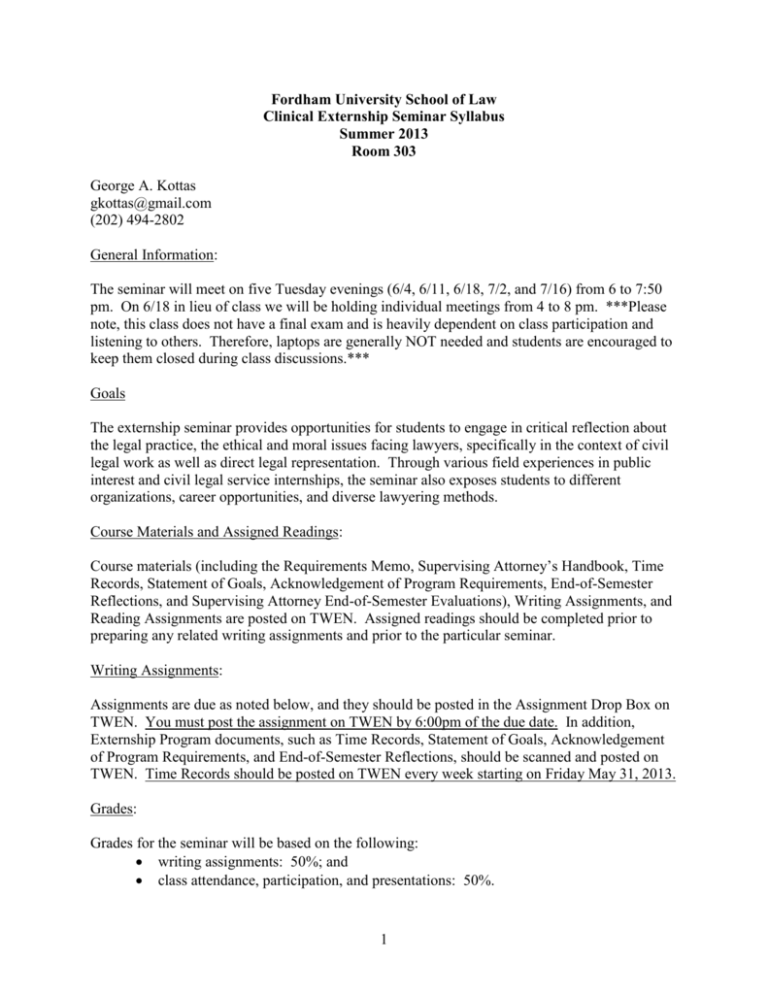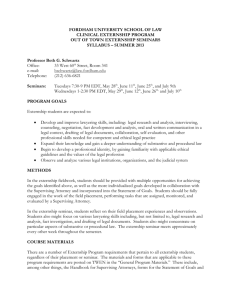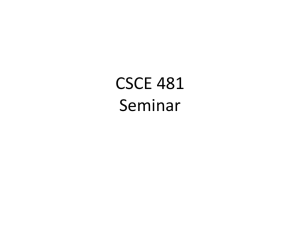Syllabus Kottas
advertisement

Fordham University School of Law Clinical Externship Seminar Syllabus Summer 2013 Room 303 George A. Kottas gkottas@gmail.com (202) 494-2802 General Information: The seminar will meet on five Tuesday evenings (6/4, 6/11, 6/18, 7/2, and 7/16) from 6 to 7:50 pm. On 6/18 in lieu of class we will be holding individual meetings from 4 to 8 pm. ***Please note, this class does not have a final exam and is heavily dependent on class participation and listening to others. Therefore, laptops are generally NOT needed and students are encouraged to keep them closed during class discussions.*** Goals The externship seminar provides opportunities for students to engage in critical reflection about the legal practice, the ethical and moral issues facing lawyers, specifically in the context of civil legal work as well as direct legal representation. Through various field experiences in public interest and civil legal service internships, the seminar also exposes students to different organizations, career opportunities, and diverse lawyering methods. Course Materials and Assigned Readings: Course materials (including the Requirements Memo, Supervising Attorney’s Handbook, Time Records, Statement of Goals, Acknowledgement of Program Requirements, End-of-Semester Reflections, and Supervising Attorney End-of-Semester Evaluations), Writing Assignments, and Reading Assignments are posted on TWEN. Assigned readings should be completed prior to preparing any related writing assignments and prior to the particular seminar. Writing Assignments: Assignments are due as noted below, and they should be posted in the Assignment Drop Box on TWEN. You must post the assignment on TWEN by 6:00pm of the due date. In addition, Externship Program documents, such as Time Records, Statement of Goals, Acknowledgement of Program Requirements, and End-of-Semester Reflections, should be scanned and posted on TWEN. Time Records should be posted on TWEN every week starting on Friday May 31, 2013. Grades: Grades for the seminar will be based on the following: writing assignments: 50%; and class attendance, participation, and presentations: 50%. 1 For Written Assignments, the following guidelines apply: A Work reflects excellent preparation, insight, and complete familiarity with the assigned materials. Writing is well organized and consistently clear. No grammatical or spelling errors. A- Work reflects very good preparation and familiarity with the assigned materials. Student work is, for the most part, clear and insightful. No grammatical or spelling errors. B+ Work meets the basic requirements. Preparation, insight and clarity are satisfactory. May have some grammatical or spelling errors B or below Written assignments are weak in comparison to other students’ work; or one or more assignments were submitted late; or work was incomplete; or work reflected a lack of familiarity with assigned course materials; or student otherwise failed to comply with instructions. May have some or many grammatical or spelling errors. 0 Student failed to hand in written assignment. For Class Participation, the following guidelines apply: A Student consistently and in a meaningful manner engages in class discussions. Participation consistently demonstrates that the student is familiar with the assigned materials. Student’s class attendance and punctuality are excellent. Student offered an engaging and interesting class presentation. Student shows effort to connect externship work with class discussion. A- Student usually engages in class discussions. Class participation typically demonstrates familiarity with the assigned materials. Student usually offers insightful comments. Student’s class attendance and punctuality are very good. Student offered a very good class presentation. B+ Student sometimes participates in class discussions and appears reasonably engaged. Class participation indicates that the student is reasonably familiar with the assigned materials. Student’s class attendance and punctuality are good. Student offered a good class presentation. B or below Student’s class participation is weak in comparison to other students’ participation; or student does not consistently participate in class discussions or appear to be engaged; or class participation reflects a lack of familiarity with the assigned materials; or student is excessively late and/or absent for class. Student’s class presentation was weak in comparison to those of the other students in the class. 2 Fieldwork Grades Fieldwork grades are Pass/Fail. In order to receive a passing grade for the fieldwork, students must meet the following requirements: 1. Satisfactory performance of fieldwork, as reported by the Supervising Attorney; 2. Submission of Time Records that reflect at least 10 hours of work per week for a minimum of 13 weeks, signed by the Supervising Attorney; 3. Submission of End-of-Semester Reflections Assignment; and 4. Completion of Online Placement Evaluation. CLASS ONE: June 4 Introductions / Overview Goal-Setting for Externship Fieldwork Ethical Issues in Externships Assignments due by the end of the first week of fieldwork: 1. Provide the name, title, and contact information of Supervising Attorney; 2. Post on TWEN: (1) signed acknowledgment of program requirements form, and (2) signed statement of goals. Reading Assignments: - This syllabus - Rule 1.6 of the NY Rules of Professional Conduct - Read Dina Francesca Haynes, Client-Centered Human Rights Advocacy, 13 Clinical L. Rev. 379 (2006); - F. Schwarz, Lawyers for Government Have Unique Responsibilities and Opportunities to Influence Public Policy, 53 N.Y.L. Sch. L. Rev. 375 (2008/09) Written assignments due 5/31 (minimum 2 pages, double-spaced, 12-point font) - Write a reaction paper to one or both of the articles. How do you see the questions presented as they related to what you expect from your summer internship? CLASS TWO : June 11 1. Assignment due 6/5: Research and Writing (bring laptops) Guest Speaker: Reference Librarian Submit research-related questions; these questions will be provided to the reference librarian, who will address them in class. No question is stupid! 3 CLASS THREE: June 18 (individual conference times to be scheduled) Assignment due 6/14: Mid-Semester Reflection Paper (minimum 1 page) Please answer the following questions: i. To date, briefly describe your duties and assignments at your placement. ii. Reflecting on your work at your organization thus far, is your work distribution satisfactory to you? If yes, which activities have been the most and least rewarding? Are there other types of assignments/activities that you would like to receive? iii. Going forward, are there ways in which your overall externship experience can be further enhanced? iv. Please review your Statement of Goals. Have you made progress in accomplishing the goals that you set for yourself at the beginning of the semester? Have you modified your goals in any way since you started at your placement? CLASS FOUR: July 2nd The Future of Law School Assigned Readings: - - Estreicher, “The Roosevelt-Cardozo Way: The Case for Bar Eligibility After Two Years of Law School,” NYU School of Law Public Law & Legal Theory Research Paper Series, Nov. 2012 Rules of the court of appeals for the Admission of attorneys and counselors at law o § 520.3 Study of Law in Law School (revised as of 4/1/12) o § 520.16 Pro Bono Requirement for Bar Admission (effective 1/1/13) o Frequently Asked Questions – Pro Bono Requirement (revised 10/1/12) http://www.nycourts.gov/attorneys/probono/FAQsBarAdmission.pdf Writing Assignment due 6/28 (minimum 2 pages, double-spaced, 12-point font) When Judge Lippmann announced the new pro bono requirement for applicants to the bar in New York State, he described it as part of a larger initiative to expand access to the civil legal system for people who cannot afford lawyers. According to the chief judge, only 20 percent of the need for legal services is being met in New York. 1. How does Rule 520.16 serve its stated purpose? In what ways does the pro bono requirement not serve its stated purpose? 2. Can you think of any other solutions to the problem of unmet legal needs in New York State? 4 3. What are your thoughts about Prof. Estreicher’s proposal that the New York Court of Appeals amend Rule 520.3 for Admission of Attorneys and Counselors at Law, to permit applicants to sit for the bar exam after completing 60 credits at an approved law school? 4. Would your opinions about the proposal be any different if an apprenticeship requirement had been included? Why/why not? 5. Prof. Estreicher poses the following question on page 608 of his paper: “What is lost by allowing students to sit for the bar after only two years of law school?” How would you answer this question? Consider this additional statement by Prof. Estreicher (also on page 608 of his paper) and be prepared to discuss the ideas contained within it during class on 7/2: “Given present trends toward emphasizing legal theory and multidisciplinary offerings, and the limited capacity of clinical courses (other than at a few richly endowed schools) to serve more than a small fraction of the graduating class, it may be questioned whether much will be lost in terms of the lawyering skills of students able to pass the bar examination after two years of law school.” CLASS FIVE: July 16 Student Presentations Assignments due 7/12: 1. Writing assignment (minimum 4 pages, double-spaced, 12-point font): Please write a paper on a topic relevant to your work at your organization or to the issue(s) raised in this seminar. The topic can be a substantive issue of law or procedure, an ethical issue, a theoretical issue, or any issue that arose during your externship that you find particularly interesting. 2. Please prepare to do a 10 to 15 minute presentation during this class. The presentation can be based on your writing assignment. ** Assignments due 7/18: 1. Writing Assignment – Final Reflections (format posted in General Program Materials) 2. Complete the online field placement evaluation (the link will be e-mailed to you) 3. Remind your Supervising Attorney to complete and submit to the Externship Program his/her evaluation of your fieldwork 5 4. Make sure you have submitted Time Records signed by your Supervising Attorney that reflect at least 20 hours of fieldwork per week for a minimum of eight weeks 6








